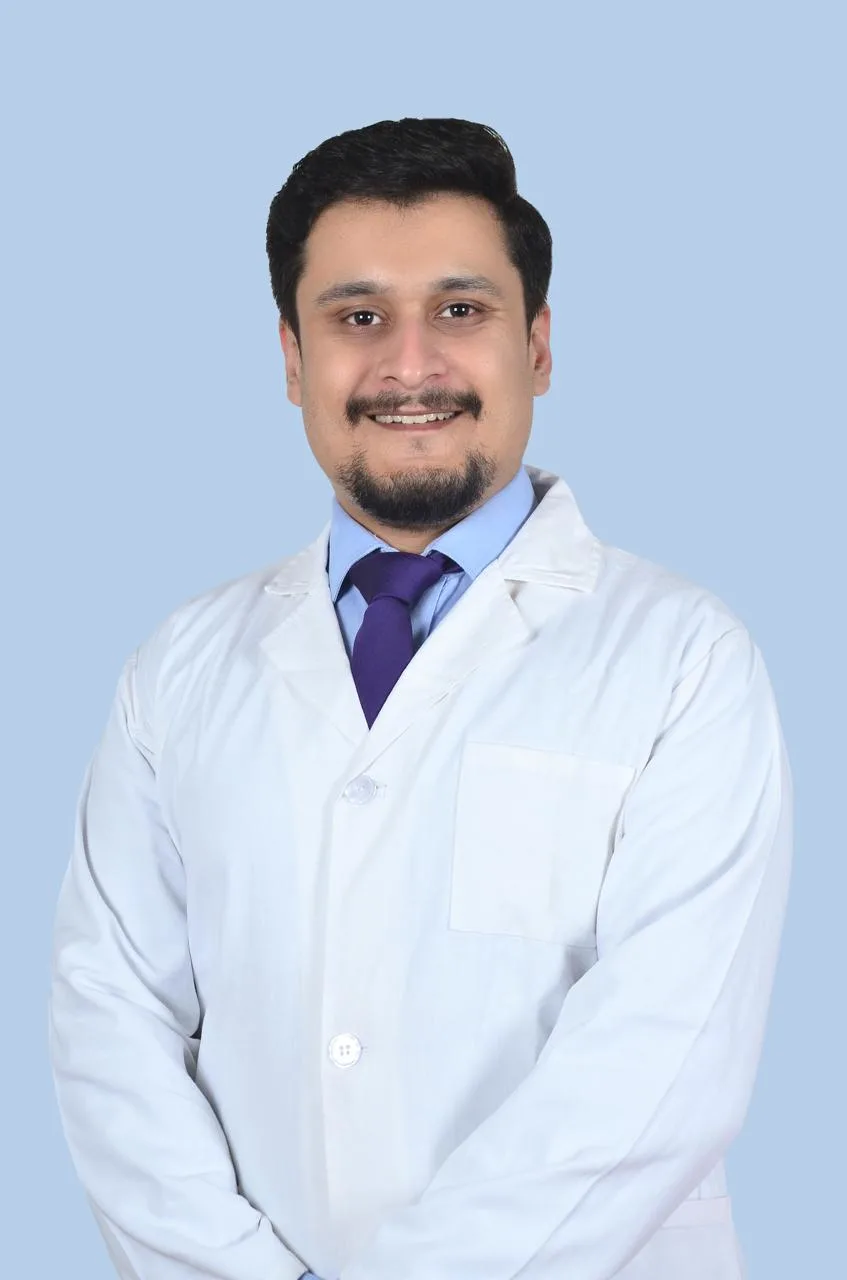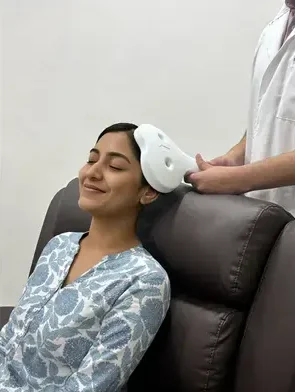Clinically Proven Care, Trusted by Thousands

What Makes Our Approach to rTMS Therapy Unique?
What is rTMS?
rTMS (Repetitive Transcranial Magnetic Stimulation) is an advanced brain stimulation treatment that uses magnetic waves to improve mood when traditional treatments like medication or therapy haven’t helped enough.
Does it Actually Work?
Yes! rTMS has been shown to be 3.3 times more effective than traditional treatments for depression and other mental health conditions.
Is it Safe?
rTMS is FDA approved and absolutely safe. It is used in leading institutions like AIIMS and CIMBS, and it’s completely pain-free and side-effect-free.
How is it administered?
During an rTMS session, you’ll sit comfortably while a small magnetic coil sends gentle pulses to parts of your brain that regulate mood. Watch the video above to see how it works in action.
Our Psychiatrists with over 40 years of Combined Experience

Dr. Akul Gupta
Consultant Psychiatrist
Therapy Mode Online, In-person
Languages Hindi, English

Dr Siddharth Sethi
Consultant Psychiatrist
Therapy Mode Online, in-person
Languages English, Hindi, Marathi

Dr. Sunil Mittal
Senior Consultant Psychiatrist
Therapy Mode Online, In-person
Languages Hindi, English
Compassionate Care from Trusted Psychiatrists
Psychiatrists at BetterPlace, Delhi, are highly trained mental health professionals who have successfully treated over 50,000 people with a range of mental health conditions including:
- Agoraphobia
- Alcohol use disorder
- Alzheimer’s disease
- Anorexia
- Anxiety and panic attacks
- Anxiety disorders
- Arachnophobia
- ADHD
- Autism spectrum disorder
- Binge Eating
- Bipolar disorder
- Body dysmorphic disorder
- Bulimia nervosa
- Claustrophobia
- Depression
- Dissociative disorders
- Gambling disorder
- Gender dysphoria
- Hoarding disorder
- Insomnia
- Mood disorders
- OCD
- Panic disorder
- Personality disorders
- PTSD
- Postpartum depression
- Schizoaffective disorder
- Schizophrenia
- Social Anxiety Disorder
- Sleep disorders
Visiting BetterPlace for rTMS Treatment? Here’s What to Expect
When visiting BetterPlace, you can expect a welcoming environment where there is 0% judgment.

Detailed First Session (90 min)
You’ll meet both a psychologist and a psychiatrist who’ll get to know your symptoms, history, and goals, especially if past treatments haven’t worked well.
Precise Diagnosis and rTMS Suitability
We use thorough assessments to confirm your diagnosis and check if rTMS is right for you, ensuring the treatment is safe, precise, and evidence-based.
Personalised Treatment Plan
If rTMS is suitable, we’ll design a plan just for you, often pairing it with therapy and lifestyle guidance to boost results. You’ll know what to expect and how progress will be tracked.
Long-term support
Our care continues beyond treatment, with follow-ups, progress tracking, and ongoing expert support to help you maintain your improvement.
Transformation Stories at BetterPlace
My brother has had depression for over 4 years and we tried so many treatments without any improvements. At BetterPlace I found out about rTMS which can help if other treatments don’t work and that has been like a miracle. Obviously i was scared initially because there was a machine but it literally was so gentle and relaxing my brother was so happy. Dr Akul has made my brother feel like himself again and he’s finally active and lively nowadays.
I’d tried almost every clinic in Delhi but no one seemed able to cure my depression. Then Better Place happened and my life truly changed for the better. And it all started when Dr Siddharth recommended I try rTMS, this really fancy technology that not many clinics have but Better Place does. I was nervous at first obv, but the people here are pros and my doctor is a gem of a person. I can’t tell you how good it feels to have a treatment that finally works!
I started smoking at 16—each cigarette felt like a warm hug, sharpening my focus. When I learned I was at risk of cancer, I tried everything to quit, but nothing worked. Then I found BetterPlace’s smoking cessation programme, which included rTMS therapy. It significantly reduced my cravings. I’ve gone from three packs a day to just one. There’s still a long way to go, but progress is progress!
Meet Our Experts for rTMS Treatment Today!
Visit us or book an online consultation
BetterPlace, East of Kailash
At National Heart InstituteFirst Floor, Annexe Building D Block, East of Kailash, New Delhi
BetterPlace, Gurugram
At Neelkanth HospitalGround floor, 1 Main Mehrauli-Gurgaon Road
DLF Phase 3, Gurugram
Best rTMS Treatment and Therapy at BetterPlace
BetterPlace is a leading provider of rTMS therapy in Delhi, offering advanced brain stimulation, psychiatry, therapy, and counselling all under one roof. Our rTMS treatment approach is guided by Dr. Sunil Mittal, one of the first people to introduce rTMS in India after its approval from the US FDA in 2008.
What Is Repetitive Transcranial Magnetic Stimulation (rTMS)?
Repetitive Transcranial Magnetic Stimulation (rTMS) is the only FDA-approved, non-invasive neuromodulatory therapy for Treatment-Resistant Depression (TRD), Obsessive-Compulsive Disorder (OCD), and Nicotine Addiction. It uses strong electromagnetic fields—similar in strength to those of an MRI—to precisely target and alter brain activity, offering a highly effective treatment for psychiatric conditions.
This treatment is ideal for individuals who do not respond well to medication, or conventional therapy, or have experienced side effects to medication.
Different Types of rTMS Therapy
Different types of rTMS therapy are defined by how the magnetic pulses are delivered and their goal.
Magnet Strength
rTMS treatment uses magnetic fields comparable in strength to an MRI machine, but targets a very specific area in the brain. The intensity of stimulation is adjusted based on the motor threshold, which varies from person to person. Motor threshold is the minimum intensity of stimulation needed to make a visible muscle movement, such as a finger twitch.
Pulse Frequency
Different frequencies are used in rTMS therapy depending on the therapeutic goal Typically, high-frequency rTMS (5-20 Hz) is used to boost brain activity in the specified region, while low-frequency rTMS (1 Hz) reduces brain activity.
Pulse Patterns
Different pulse patterns are designed to achieve different results. Theta Burst Stimulation (TBS) mimics natural brain wave patterns (theta rhythms) to cause more effective changes in brain activity. In contrast, traditional rTMS provides continuous bursts of magnetic stimulation to inhibit or stimulate neural circuits.
Magnetic Coil Type and Stimulation Target
Regular TMS uses a standard figure-8 pattern coil to target surface-level areas of the brain. While deep TMS (dTMS) uses a figure-H coil to reach deeper areas of the brain.
Why Is rTMS Used and How Does It Work?
rTMS therapy is used for treating TRD, OCD, and substance addictions, especially in cases where conventional treatment options such as medication and therapy have failed or if the person receiving treatment has shown severe side effects to the medication. rTMS therapy generally has fewer side effects and offers long-term benefits.
Repetitive Transcranial Magnetic Stimulation (rTMS) uses magnetic pulses to stimulate specific areas in the brain, primarily the prefrontal cortex which plays a key role in mood regulation. They either stimulate or inhibit neuronal activity in the brain, resulting in mood and behaviour changes. High-frequency rTMS (10 Hz or more) typically boosts brain activity, while low-frequency rTMS (1 Hz or less) reduces it. This stimulation promotes brain plasticity, helping the brain form new neuronal connections and improve overall functioning.
Side Effects and Risks
rTMS treatment is generally considered safe and well-tolerated. Like any medical procedure, it may involve some potential side effects although they are mild and temporary. These are listed below:
Common Side Effects
Most people describe the sensation as light, gentle taps on their heads. Common side effects include drowsiness, lightheadedness, scalp discomfort, tingling, spasms, and twitching of facial muscles.
Rare Complications
Rare complications include seizures, which only happen in people with pre-existing seizure disorders. Hypomania or mania is mostly seen in individuals who have Bipolar Disorder.
Cost of rTMS Treatment in Delhi, at BetterPlace
The cost of rTMS treatment in Delhi depends on various factors such as the technician’s experience, the type of machine, treatment protocol, and the total number of sessions needed.
At BetterPlace, we use industry-standard, top-of-the-line brain stimulation machines by Neurosoft. The cost of a single rTMS therapy session with us ranges from INR 3,000 to INR 5,000. The final cost depends on your treatment schedule, selected package, and the treatment protocol. Before the treatment, our psychiatrists will conduct a thorough workup of your condition, case, past medical history, etc. This will help us set a baseline for your treatment and adjust it accordingly.
FAQs about rTMS Therapy
Before a TMS therapy session, our psychiatrist will take a detailed case history of you, understanding your previous medical history. They then screen you for epilepsy, seizures, any medication you’re on or if you have braces, cochlear implants, aneurysm clip, etc. This helps us ensure that your treatment is safe and effective.
During an rTMS therapy session, you will be seated comfortably in a chair, and our psychiatrists will reduce noise in the room to make you more comfortable. They will place a magnetic coil over your head, which will provide gentle pulses to your brain through the skull. A single session is 20-30 minutes long, and you can resume your normal life right after the session is complete.
rTMS treatment is used when standard treatments such as medication and therapy have not shown any significant improvements or resulted in side effects. It is generally used for Treatment-Resistant Depression (TRD), OCD, and addictions.
There is no recovery time needed after an rTMS session. You can go about your life and continue to function as you normally would right after the session.
TMS refers to the broader use of magnetic fields to stimulate brain activity, where a magnetic coil is placed on the scalp and pulses of different frequencies are applied to the brain. rTMS treatment is a type of TMS treatment where magnetic pulses are continuously applied to the brain in short bursts to either inhibit or stimulate the neuronal connections in the brain.
The frequency of rTMS treatment depends on your treatment plan which is personalised to suit your needs. Generally, a few sessions a week are prescribed but this could be different based on your requirements.
rTMS as a treatment for Anxiety Disorders and Post-Traumatic Stress Disorder (PTSD) is still being researched. However, early studies show promising results, especially for persons with comorbid depression and anxiety. Ongoing research suggests rTMS therapy could be a viable treatment option.








